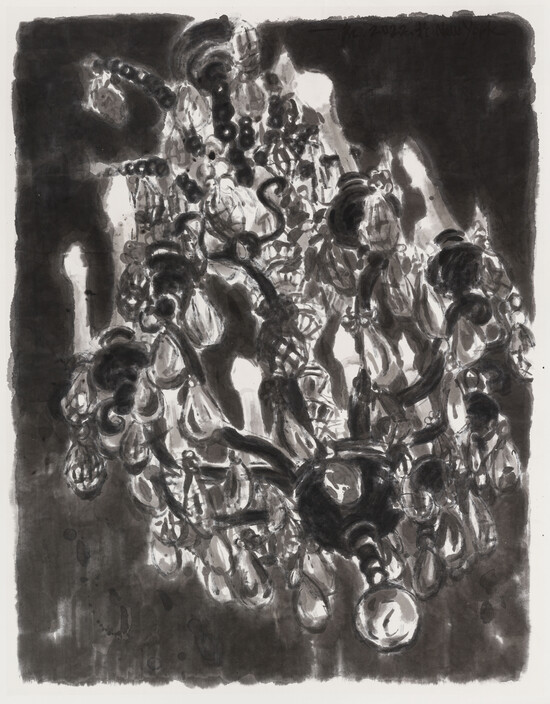WU YIMING 邬一名
b. 1966, works and lives in New York City

Current And Upcoming Exhibitions:
Tang Guo & Wu Yiming,
Liaigre, Shanghai,
10.22, 2025
- 04.22, 2026
Introduction
Since the early 1990s, Wu Yiming has been ceaselessly focusing on ink painting. Now it comes to light that the artist’s early painting occurred against the background of an era that witnessed the collision of Chinese modern ink painting and Western painting. Ink painting, as a means of artistic expression, was on one hand facing the dilemma of surmounting the bond of tradition, and on the other in need of a resolution by criticism of and learning from realism, abstract art, and expressionism in western art history. WU Yiming and the artists of his generation shouldered from the very beginning the mission to reconcile the conflict between Chinese and Western painting. Moreover, he drifted between the traditional spirit and modernism, which constituted precisely the unique style and quality of his artwork. The characters in the early stage of his work appear very impressive: The figures all lack facial expressions; they seem distorted or stretched, often hovering or dashing. WU's unrivaled language of expression was formed during this period. Through ink, watercolors, and acrylic applied in a multiplicity of layers, the paintings were rendered with ambiguity and intimacy. The images characterized by obscurity and alienation show the artist's view towards the furor of contemporary Chinese society and his refinement and interpretation of people's psychological distance. Furthermore, WU created the images of buddha, the statue of liberty, and Beuys all destitute of facial expressions, and presented them in the language of sculpture. Even after the materialization of the "blankness", viewers can still easily identify these "faceless classics". In this way, WU investigated the construction of cultural symbols as well as the spread of cultural authority, giving a hint to the concepts which probably bore the semblance of the purposes and possibilities of art.In the new series of ink paintings by WU, however, we can hardly find signs of the artist's concerns with either society or history. His art creation has entered a new phase of intensified personalization, like literati at leisure or in a playful state after a nice cup of tea or a tasty meal. WU Yiming depicts images such as a blooming orchid, the corner of a water pond, a pair of dancing swans, a car on an empty ground, the spectrum of a neon light, and so forth, for painting has been naturally integrated into his everyday life. At this moment, the portraits by the artist already possess a concrete meaning, such as those of friends or designers. Rendered in a seemingly casual way, they are nevertheless utterly dissimilar to the blurred and average faces of humankind. WU Yiming is quite familiar with the people in his own paintings, including their life experience and academic achievement, and thus manages to paint their portraits with remarkable vividness. WU Yiming's paintings move towards idle privacy, which exhibits exactly an aspect of the development of Chinese contemporary painting. After clarification of the intricate relationship between tradition and modernity, the new realization of the social functions of artists and the understanding of the purpose of art enables WU Yiming and other artists to focus consciously on the notion of self-existence. Closely related to their creators, these images are associated as well with painting per se as the social reality.
WU Yiming, born in 1966 in Shanghai, graduated from the Fine Arts Department of East China Normal University. He now lives and works in New York. The selected exhibitions include: WU Yiming: Painting the Banal, ShanghART, Shanghai (2018); Light in the Dark, Mind Set Art Center, Taipei (2017); WU Yiming Recent Works, ShanghART, Beijing (2015); The Beginning of Good Life, Wu Yiming solo exhibition, Mind Set Art Center, Taibei (2014); The Other Side of Time - WU Yiming Solo Exhibition, ShanghART Gallery, Shanghai (2012); Another Scene - Artists' Projects, Concepts and Ideas, ShanghART H-Space, Shanghai (2009); The World of Other's: A Contemporary Art Exhibition, Museum of Contemporary Art, Shanghai (2008); Harmony and Difference, East China Contemporary Sculpture Invitational Exhibition, Shanghai (2007); Contemporary Chinese Art, Gallery Karsten Greve, Cologne, Germany (2006); FOCUS: Wu Yiming's Works on Paper and Sculptures, ShanghART Gallery, Shanghai (2006); Time Ex., UMA Gallery, Hong Kong (2005); China, Contemporary Painting, Fondazione Cassa di Risparmio, Bologna, Italy (2005); Dreaming of the Dragon's Nation, Contemporary Art from China, IMMA (Irish Museum of Modern Art), Dublin, Ireland (2004); Wu Yiming: Works on Paper 98-99, ShanghART Fuxing Park, Shanghai (1999), etc.

